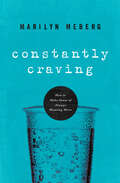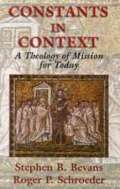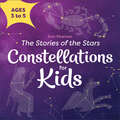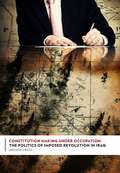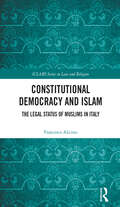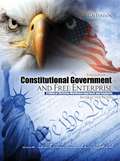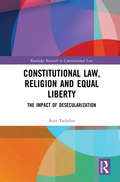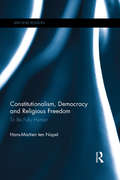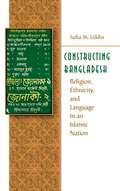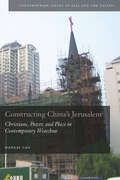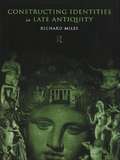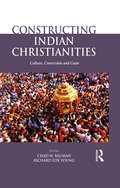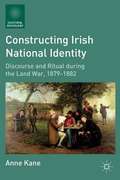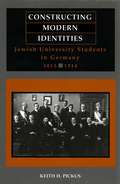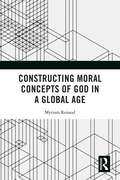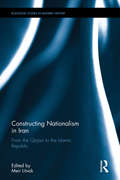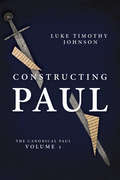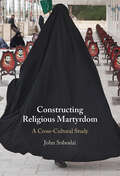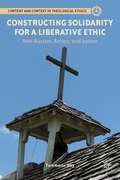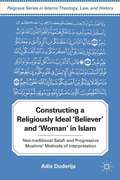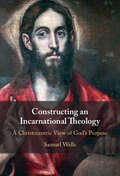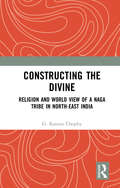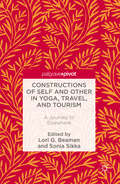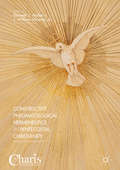- Table View
- List View
Constantly Craving: How to Make Sense of Always Wanting More
by Marilyn MebergWe want more. More peace. More excitement. More romance. More free time. More chocolate . . .Our cravings are written into our DNA. They’re influenced by our childhood experiences. They’re driving the choices we make as adults. And often, they’re keeping us hungry. Never satisfied. Ever searching.What do they mean? What are we to do with them? Should we feel guilty? Are there solutions?Counselor and author Marilyn Meberg knows all about cravings. She also knows the One who knit us together, desires and all. With wit and compassion, Marilyn helps us understand our appetites, offers advice for managing them here on earth, and encourages us to eagerly await the day when we will find total satisfaction in heaven. In the meantime, Constantly Craving is an excellent reminder that our desires for more can lead us to the One we really need, the only One who will quench our thirst forever. Really? Really!
Constants In Context: A Theology of Mission for Today (American Society Of Missiology Ser. #30)
by Stephen B. Bevans Roger P. SchroederTraces the history and theology of mission from the origins of Christianity to the present providing the most up-to-date and complete book of its kind. Constants in Context possesses a depth and structure that make it the standard account of both the history and theology of Christian mission.
Constellations for Kids: The Stories of the Stars
by Ann PearsonWith this constellation book, kids will learn some of the most famous myths and legends connected to the stars. It's full of amazing kids' stories that explore everything from the Big Dipper to the adventures of Hercules!People have always looked up at the stars and seen shapes—and created stories about them. In this book for kids 3-5, you can discover constellations and the stories of how they came to be.Blast off into this star book:See into the sky—Bring the constellations to life with illustrations and sky maps that will get kids excited about each new story.Astronomy for kids—Explore where and when to see each constellation in the sky, with tips to help kids (and adults) spot them Name the stars— Did you know that the constellation Cancer symbolizes a giant crab? Or that Aries represents a ram with wings?Show little ones the incredible mythology above their heads with this toddler-friendly introduction to the stories of the constellations!
Constitution Making Under Occupation: The Politics of Imposed Revolution in Iraq
by Andrew AratoThe attempt in 2004 to draft an interim constitution in Iraq and the effort to enact a permanent one in 2005 were unintended outcomes of the American occupation, which first sought to impose a constitution by its agents. Andrew Arato is the first person to record this historic process and analyze its special problems. He compares the drafting of the Iraqi constitution to similar, externally imposed constitutional revolutions by the United States, especially in Japan and Germany, and identifies the political missteps that contributed to problems of learning and legitimacy.
Constitutional Democracy and Islam: The Legal Status of Muslims in Italy (ICLARS Series on Law and Religion)
by Francesco AlicinoThis book outlines the legal status of Muslims in Italy. In particular, it highlights that, when it comes to Islam, the Italian legal system exacerbates the dilemma of contemporary constitutional democracies, increasingly caught between the principle of equality and the right to have rights, which implies the respect of diversity. It provides readers with a deep understanding of how domestic and external socio-political factors may muddle the interpretation of Italy’s constitutional provisions, starting with those relating to state secularism and religious freedom. It is argued that today, as never before, these provisions are torn between the principle of equality and the right to be different. This situation has been exacerbated by incessant states of emergency, from immigration to religion-inspired terrorism, in light of which the presence of Islam in the peninsula has been highly politicized. Italy’s experience on the legal status of Muslims provides an interesting case study and, as such, a valuable source of empirical information for a functioning and pluralistic constitutional democracy, especially when dealing with conditions of fear and insecurity. The book will be of interest to researchers, academics, and policy-makers working in the areas of law and religion, constitutional law, comparative law, and human rights.
Constitutional Government and Free Enterprise: A Biblical Christian Worldview Approach and Emphasis: Interactive Notes
by Gai Ferdon“Constitutional Government and Free Enterprise: A Biblical Christian Worldview Approach and Emphasis, Interactive Notes originated from the need to further equip my own freshman students here at Liberty University with an understanding of the basic core essentials and components of worldviews of the Western tradition, with specific focus on the Biblical Christian worldview and its impact on American history and institutions. After years of teaching worldview studies and similar materials at the undergraduate and even high school levels, I became better acquainted with the intellectual challenges students faced, and decided to create a series of class lecture notes to coordinate with required course texts for an entry-level course designed specifically for government majors within the Helms School of Government. The first set of these lectures was compiled and augmented into a first edition in 2014, and revised again into a second edition in the spring of 2019. This third edition contains more interactive features intended to enhance the readers learning experience.” – from the author’s Preface.
Constitutional Law, Religion and Equal Liberty: The Impact of Desecularization (Routledge Research in Constitutional Law)
by Azin TadjdiniDuring the 20th century many countries embarked on a process of constitutional secularization by which the role of religion gradually became limited. Yet, by the late 20th century, and increasingly following the end of the Cold War, this development began to be challenged. This book examines the return of religion in constitutions through the concept of constitutional de-secularization. It places this phenomenon in the context of the constitutional memory of the countries in which it has taken place and critically examines it against the development and standards of constitutionalism, as the prevailing constitutional legal and political theory. Central to this analysis is the impact of constitutional de-secularization on the regulation of equality in liberty, that is, both the regulation of constitutional rights and the scope for equality of those who are granted such rights. The book argues that equal liberty forms an essential part of constitutionalism as a theory, and that constitutionalism therefore entails a continuous development towards expanding it. The first and second part of the book presents a conceptual framework for the study of constitutional de-secularization. The third part presents and analyses three cases of constitutional de-secularization in Afghanistan, Iran and Iraq. The book will be of interest to researchers and policy-makers interested in constitutional history and theory, and the role of religion in law and its compatibility with human rights.
Constitutionalism, Democracy and Religious Freedom: To be Fully Human (Law and Religion)
by Hans-Martien ten NapelIn both Europe and North America it can be argued that the associational and institutional dimensions of the right to freedom of religion or belief are increasingly coming under pressure. This book demonstrates why a more classical understanding of the idea of a liberal democracy can allow for greater respect for the right to freedom of religion or belief. The book examines the major direction in which liberal democracy has developed over the last fifty years and contends that this is not the most legitimate type of liberal democracy for religiously divided societies. Drawing on theoretical developments in the field of transnational constitutionalism, Hans-Martien ten Napel argues that redirecting the concept and practice of liberal democracy toward the more classical notion of limited, constitutional government, with a considerable degree of autonomy for civil society organizations would allow greater religious pluralism. The book shows how, in a postsecular and multicultural context, modern sources of constitutionalism and democracy, supplemented by premodern, transcendental legitimation, continue to provide the best means of legitimating Western constitutional and political orders.
Constructing Bangladesh
by Sufia M. UddinHighlighting the dynamic, pluralistic nature of Islamic civilization, Sufia M. Uddin examines the complex history of Islamic state formation in Bangladesh, formerly the eastern part of the Indian province of Bengal. Uddin focuses on significant moments in the region's history from medieval to modern times, examining the interplay of language, popular and scholarly religious literature, and the colonial experience as they contributed to the creation of a unique Bengali-Islamic identity.During the precolonial era, Bengali, the dominant regional language, infused the richly diverse traditions of the region, including Hinduism, Buddhism, and, eventually, the Islamic religion and literature brought by Urdu-speaking Muslim conquerors from North India. Islam was not simply imported into the region by the ruling elite, Uddin explains, but was incorporated into local tradition over hundreds of years of interactions between Bengalis and non-Bengali Muslims. Constantly contested and negotiated, the Bengali vision of Islamic orthodoxy and community was reflected in both language and politics, which ultimately produced a specifically Bengali-Muslim culture. Uddin argues that this process in Bangladesh is representative of what happens elsewhere in the Muslim world and is therefore an instructive example of the complex and fluid relations between local heritage and the greater Islamic global community, or umma.
Constructing China's Jerusalem: Christians, Power, and Place in Contemporary Wenzhou
by Nanlai CaoDrawing on extensive ethnographic fieldwork and in-depth life history interviews, this illuminating book provides an intimate portrait of contemporary Chinese Christianity in the context of a modern, commercialized economy. In vivid detail, anthropologist Nanlai Cao explores the massive resurgence of Protestant Christianity in the southeastern coastal city of Wenzhou--popularly referred to by its residents as "China's Jerusalem"--a nationwide model for economic development and the largest urban Christian center in China. Cao's study of Chinese Christians delves into the dynamics of activities such as banqueting, network building, property acquisition, mate selection, marriage ritual, migrant work, and education. Unlike previous research that has mainly looked at older, rural, and socially marginalized church communities, Cao trains his focus on economically powerful, politically connected, moralizing Christian entrepreneurs. In framing the city of Wenzhou as China's Jerusalem, newly rich Chinese Christians seek not only to express their leadership aspirations in a global religious movement but also to assert their place, identity, and elite status in post-reform Chinese society.
Constructing Identities in Late Antiquity
by Richard MilesThe essays in Constructing Identities in Late Antiquity concern themselves with the theme of identity, an increasingly popular topic in Classical studies. Through detailed discussions of particular Roman texts and images, the contributors show not only how these texts were used to create and organise particular visions of late antique society and culture, but also how constructions of identity and culture contributed to the fashioning of 'late antiquity' into a distinct historical period.
Constructing Indian Christianities: Culture, Conversion and Caste
by Chad M. Bauman Richard Fox YoungThis volume offers insights into the current ‘public-square’ debates on Indian Christianity. Drawing on ethnographic fieldwork as well as rigorous analyses, it discusses the myriad histories of Christianity in India, its everyday practice and contestations and the process of its indigenisation. It addresses complex and pertinent themes such as Dalit Indian Christianity, diasporic nationalism and conversion. The work will interest scholars and researchers of religious studies, Dalit and subaltern studies, modern Indian history, and politics.
Constructing Irish National Identity
by Anne KaneA major statement in both historical and cultural sociology, "Constructing Irish Nationalist Identity: Ritual and Discourse during the Land War, 1879-1882," provides a theoretical and methodological model for analyzing symbolic and social transformation in major historical events. Synthesizing the strong program in cultural sociology with eventful temporality, Anne Kane demonstrates the construction of political alliance and the emergence of a counter hegemonic cultural structure over the course of a political movement and campaign. Through deep analysis of the discursive struggles of contentious participants - tenant farmers, nationalists, and the Irish Catholic Church - in the multitudinous enchained ritualistic events of the Irish Land War, Kane illuminates the construction of a reconfigured Irish Nationalist Identity.
Constructing Modern Identities: Jewish University Students in Germany, 1815-1914
by Keith PickusThe emergence of Jewish student associations in 1881 provided a forum for Jews to openly proclaim their religious heritage. By examining the lives and social dynamics of Jewish university students, Keith Pickus shows how German Jews rearranged their self-images and redefined what it meant to be Jewish. Not only did the identities crafted by these students enable them to actively participate in German society, they also left an indelible imprint on contemporary Jewish culture. Pickus's portrayal of the mutability and social function of Jewish self-definition challenges previous scholarship that depicts Jewish identity as a static ideological phenomenon. By illuminating how identities fluctuated throughout life, he demonstrates that adjusting one's social relationships to accommodate the Gentile and Jewish worlds became the norm rather than the exception for 19th-century German Jews.
Constructing Moral Concepts of God in a Global Age
by Myriam RenaudConstructing Moral Concepts of God in a Global Age focuses on what people say and think about God, rather than on arguments about God's existence. It advances a theological method, or step-by-step approach to explore and reframe personal convictions about God and the worldviews shaped by those convictions. Since a moral God is more likely to foster a moral life, this method integrates an ethical check to ensure that understandings of God and their associated worldviews are validly moral. The proposed method builds on the work of twentieth-century theologian Gordon Kaufman during the Kantian phase of his work. It anticipates a person-like God who hears prayers, loves without end, and comforts in times of hardship. To accommodate today’s pluralistic and globalized world, the ethical check integrated in the method is a widely collaborative and vetted global ethic, the Parliament of the World’s Religions "Declaration Towards a Global Ethic." This volume of constructive philosophical theology is written for seminary students, educators, clergy, study groups, and anyone interested in delving more deeply and systematically into understandings of God, whether their own or those of others.
Constructing Nationalism in Iran: From the Qajars to the Islamic Republic (Routledge Studies in Modern History)
by Meir LitvakNationalism has played an important role in the cultural and intellectual discourse of modernity that emerged in Iran from the late nineteenth century to the present, promoting new formulations of collective identity and advocating a new and more active role for the broad strata of the public in politics. The essays in this volume seek to shed light on the construction of nationalism in Iran in its many manifestations; cultural, social, political and ideological, by exploring on-going debates on this important and progressive topic.
Constructing Paul (The Canonical Paul, vol. 1)
by Luke Timothy JohnsonFirst of a two-volume work providing a framework for understanding the life and thought of the apostle PaulIn this methodological tour de force, Luke Timothy Johnson offers an articulate, clear, and thought-provoking portrait of the life and thought of the apostle Paul.Drawing upon recent developments in the study of Paul, Johnson offers readers an invitation to the Apostle Paul. Rather than focusing on a few of Paul&’s letters, Johnson lays out the materials necessary to envision the apostle from the thirteen canonical letters of Paul and the Acts of the Apostles. Constructing Paul thus provides a framework within which an engagement with Paul&’s letters can take place. Johnson demonstrates the possibility of doing responsible and creative work across the canonical collection without sacrificing literary or historical integrity.By bringing out the facets of the apostle from the canonical evidence, Johnson shows the possibilities for further and better inquiry into the life and thought of Paul. This first volume imagines a plausible biography for Paul and serves as an introduction to the studies in the second volume. Constructing Paul addresses all the pertinent questions related to the study of Paul. Johnson uses the canonical material as building blocks to make a case for why Paul ought to be heard today as a liberating rather than oppressing voice.
Constructing Paul (The Canonical Paul, vol. 1)
by Luke Timothy JohnsonFirst of a two-volume work providing a framework for understanding the life and thought of the apostle PaulIn this methodological tour de force, Luke Timothy Johnson offers an articulate, clear, and thought-provoking portrait of the life and thought of the apostle Paul.Drawing upon recent developments in the study of Paul, Johnson offers readers an invitation to the Apostle Paul. Rather than focusing on a few of Paul&’s letters, Johnson lays out the materials necessary to envision the apostle from the thirteen canonical letters of Paul and the Acts of the Apostles. Constructing Paul thus provides a framework within which an engagement with Paul&’s letters can take place. Johnson demonstrates the possibility of doing responsible and creative work across the canonical collection without sacrificing literary or historical integrity.By bringing out the facets of the apostle from the canonical evidence, Johnson shows the possibilities for further and better inquiry into the life and thought of Paul. This first volume imagines a plausible biography for Paul and serves as an introduction to the studies in the second volume. Constructing Paul addresses all the pertinent questions related to the study of Paul. Johnson uses the canonical material as building blocks to make a case for why Paul ought to be heard today as a liberating rather than oppressing voice.
Constructing Religious Martyrdom: A Cross-Cultural Study
by John SoboslaiMartyrdom is a phenomenon common to many of the world's religious traditions. But why? In this study, John Soboslai offers insights into the practices of self-sacrifice within specific sociopolitical contexts. Providing a new understanding of martyrdom through the lens of political theology, he analyzes discourses and performances in four religious traditions during social and political crises, beginning with second-century Christianity in Asia Minor, where the term 'martyr' first took its meaning. He also analyzes Shi'a Islam in the 1980s, when 'suicide bombing' first appeared as a strategy in West Asia; global Sikhism during World War I, where martyrs stood for and against the British Raj; and twenty-first-century Tibetan Buddhism, where self-immolators used their bodies in opposition to the programs of the People's Republic of China. Presenting a new theory of martyrdom linked to constructions of sovereign authority, Soboslai reveals common features of self-sacrifice and demonstrates how bodily performances buttress conceptions of authority.
Constructing Solidarity for a Liberative Ethic
by Tammerie DayConstructing Solidarity offers a critical path toward the transformation of white worldviews, theologies, ethics, and praxis for scholars, activists, religious leaders, and those seeking guidance.
Constructing a Religiously Ideal "Believer" and "Woman" in Islam
by Adis DuderijaWho or what is a religiously ideal Believer and Woman in Islam? This book identifies, compares, and contrasts how two contemporary Muslim groups here termed Neo-Traditional Salafis and progressive Muslims interpret the Qur'an and Sunna in order to construct what each considers to be a religiously ideal concept of a "Believer" and "Woman" in Islam. This is the first work which systematically focuses on identifying and explaining which interpretational mechanisms are responsible for the often very different interpretations of these two concepts.
Constructing an Incarnational Theology: A Christocentric View of God's Purpose
by Samuel WellsWhy did Jesus come? The traditional argument is that he came to redeem us from sin and destroy death, and thus reverse the fall. Many have long found this unsatisfactory, because it centres human deficit, rather than divine abundance. In this study, Samuel Wells traces his notion of 'being with' right into the Trinity itself, and in dialogue with Maximus the Confessor, Duns Scotus and Karl Barth, among others, articulates a truly Christocentric theology in which God's means and God's ends are identical. In the process, Wells not only greatly expands the compass of 'being with,' showing its scriptural and doctrinal significance, but also offers a constructive account of the incarnation, cross and resurrection of Jesus that out-narrates conventional atonement theories. Wells correspondingly proposes an account of sin, evil, suffering and death that accords with this revised understanding. The result is a compelling and transformational proposal in incarnational theology.
Constructing the Divine: Religion and World View of a Naga Tribe in North-East India
by G. Kanato ChophyFrom being characterized as ‘primitive tribe’ in the colonial imagination to become predominantly practitioners of the American Baptist faith, the Sumi Naga – formerly known as the Sema Naga – in the North-East Indian state of Nagaland have come a long way ever since this Naga tribe encountered the white man toward the latter half of the nineteenth century.This book in a way chronicles the transition of Sumi society from the period of colonial contact up to the present-day context. A critical understanding of Sumi society and culture is at the heart of the narrative, and the analysis of Sumi religion and world view remains the main thrust of this book. It is argued that the Sumi, who are overwhelmingly Baptists, are faced with new religious issues which has brought about not only schismatic divisions but also rendering ebullience to religious life, and that a new discourse has emerged in Sumi religion. The author positions himself as an ‘insider’, and in doing so has given a reflexive account of Sumi religious life, meanwhile substantiating the arguments and findings in the light of contemporary theoretical developments. The volume brings out compelling evidence that religion significantly shapes the daily life of the Sumi. It offers a detailed ethnographic study of Sumi religion and world view, as the Sumi Naga was seldom studied in-depth in the post-Independence period. Please note: Taylor & Francis does not sell or distribute the Hardback in India, Pakistan, Nepal, Bhutan, Bangladesh and Sri Lanka
Constructions of Self and Other in Yoga, Travel, and Tourism: A Journey to Elsewhere
by Sonia Sikka Lori G. BeamanThis volume considers the phenomenon of yoga travel as an instance of a broader genre of spiritual travel involving journeys to places elsewhere, which are imagined to offer the possibility of profound personal transformation. These imaginings are tied up in a continued exoticization of the East, but they are not limited to that. Contributors identify various themes such as authenticity, suffering, space, material markers, and the idea of the spiritual, tracing how these ideas manifest in conceptions and fetishizations of elsewhere. To deepen its analysis of this phenomenon, the book incorporates a wide range of disciplines including architecture, sociology, anthropology, philosophy, women s studies, religious studies, and history. While the book s primary focus is yoga and yoga travel, contributors offer up an array of other case studies. Chapters delve into the complex questions of agency and authenticity that accompany the concept of spiritual travel and ideas of elsewhere. "
Constructive Pneumatological Hermeneutics in Pentecostal Christianity (Christianity and Renewal - Interdisciplinary Studies)
by Kenneth J. Archer And L. William Oliverio Jr.This book presents the work of leading hermeneutical theorists alongside emerging thinkers, examining the current state of hermeneutics within the Pentecostal tradition. The volume’s contributors present constructive ideas about the future of hermeneutics at the intersection of theology of the Spirit, Pentecostal Christianity, and other disciplines. This collection offers cutting-edge scholarship that engages with and pulls from a broad range of fields and points toward the future of Pneumatological hermeneutics. The volume’s interdisciplinary essays are broken up into four sections: philosophical hermeneutics, biblical-theological hermeneutics, social and cultural hermeneutics, and hermeneutics in the social and physical sciences.
